Paul Levinson's Blog: Levinson at Large, page 228
January 26, 2017
Colony 2.3: The Wall
Just as Trump is railing on about his wall, Colony 2.3 has a harrowing scene of Will and Charlie scaling a wall, against enemy drone fire that threatens to pick them off. Two of the people on the rope are indeed killed.
And, indeed, intentionally or not, Colony is shaping up this season as a slightly futuristic scenario of what the new President and his worst advisers may want to have in store for us. Or, who knows what the new President wants, and to what extent he's aware of the consequences.
But just as in our reality, a large part of the story of Colony is the resistance, and how that plays out against collaborators and the unseen aliens - real aliens from outer space, bad aliens, in contrast to our immigrants who good are human beings who want to be part of the American fabric.
Or at least, the American fabric prior to now. Just as we have no idea where Colony is headed, which makes for good narrative fiction, we have little idea where America is now headed - or how this will all turn out - which makes for a dangerous reality.
Fiction in a dangerous world takes on a new tone, especially if that fiction bears a resemblance to what is going on, off the page and the screen. And this tension is only heightened, when the people in power in our reality - Trump and Bannon - turn their fire on the media, which includes not only news today but maybe even science fiction like Colony tomorrow.
And I'll be back here with another review next week.
Paul Levinson's books ... Paul Levinson's music
And, indeed, intentionally or not, Colony is shaping up this season as a slightly futuristic scenario of what the new President and his worst advisers may want to have in store for us. Or, who knows what the new President wants, and to what extent he's aware of the consequences.
But just as in our reality, a large part of the story of Colony is the resistance, and how that plays out against collaborators and the unseen aliens - real aliens from outer space, bad aliens, in contrast to our immigrants who good are human beings who want to be part of the American fabric.
Or at least, the American fabric prior to now. Just as we have no idea where Colony is headed, which makes for good narrative fiction, we have little idea where America is now headed - or how this will all turn out - which makes for a dangerous reality.
Fiction in a dangerous world takes on a new tone, especially if that fiction bears a resemblance to what is going on, off the page and the screen. And this tension is only heightened, when the people in power in our reality - Trump and Bannon - turn their fire on the media, which includes not only news today but maybe even science fiction like Colony tomorrow.
And I'll be back here with another review next week.
Paul Levinson's books ... Paul Levinson's music
Published on January 26, 2017 21:52
Moving the Doomsday Clock Forward 30 Seconds Does More Harm than Good
This may come as a surprise to you, my readers, but I think the moving of the Doomsday Clock by the Science and Security Board of the Bulletin of the Atomic Scientists 30 seconds forward, so it's now 2 and 1/2 not 3 minutes to midnight, does more harm than good. I agree completely with the reasons given for the unprecedented move (first time in the Clock's 70-year history), ranging from Donald Trump in the White House to the rise of fake news, but I think the clock exacerbates the problems, especially the crisis of fake news and its effects, and the deterioration of the public's understanding of science.
Science is supposed to be about the search for truth, and the test of results, all via methods that make it likely that facts and truth have been discovered (see Karl Popper for more). Scientists are of course entitled and encouraged (as are all human being) to have opinions on political and social issues which go beyond science. There's nothing whatsoever wrong with a scientist saying I, as a scientist, have such and such a political view, for the following reasons. Nor is there anything wrong with scientists or anyone agreeing or disagreeing with a political view because they think that view runs contrary to science. Indeed, expression of such disagreement is a public service.
But there is something harmful in presenting political views, and social forecasts, in a literally numerical package which, frankly, feigns the imprimatur of science. Hari Seldon's psychohistory sought to do that in Isaac Asimov's Foundation trilogy, but that is superb science fiction not fact.
The fact is that the metaphor of the clock is just that - a metaphor. Two and 1/2 minutes to midnight has no more correspondence to the reality of present or future than does 3 minutes or 30 minutes. It is just a clever way of calling attention to concerns that scientists have - scientists who are not Hari Seldon, and therefore have no better mathematical way of predicting the future than anyone else outside of characters in science fiction.
And it hurts science, and the public's confidence in it, precisely at a time when we most need it. Scientific research and models which show climate change come from real evidence and events, and we need that respected as such. The Doomsday Clock is a dramatization of understandable opinions - opinions which I share - but which ought not be presented or even implied to be in any way the result of scientific research.
Indeed, to present such as concerns as science is in itself a form of fake news, which thrives in making the boundaries between science and opinion even less clear than they now are. I think the best thing that can be done with the Doomsday Clock is retire it.

more about fake news here Paul Levinson's books ... Paul Levinson's music
Science is supposed to be about the search for truth, and the test of results, all via methods that make it likely that facts and truth have been discovered (see Karl Popper for more). Scientists are of course entitled and encouraged (as are all human being) to have opinions on political and social issues which go beyond science. There's nothing whatsoever wrong with a scientist saying I, as a scientist, have such and such a political view, for the following reasons. Nor is there anything wrong with scientists or anyone agreeing or disagreeing with a political view because they think that view runs contrary to science. Indeed, expression of such disagreement is a public service.
But there is something harmful in presenting political views, and social forecasts, in a literally numerical package which, frankly, feigns the imprimatur of science. Hari Seldon's psychohistory sought to do that in Isaac Asimov's Foundation trilogy, but that is superb science fiction not fact.
The fact is that the metaphor of the clock is just that - a metaphor. Two and 1/2 minutes to midnight has no more correspondence to the reality of present or future than does 3 minutes or 30 minutes. It is just a clever way of calling attention to concerns that scientists have - scientists who are not Hari Seldon, and therefore have no better mathematical way of predicting the future than anyone else outside of characters in science fiction.
And it hurts science, and the public's confidence in it, precisely at a time when we most need it. Scientific research and models which show climate change come from real evidence and events, and we need that respected as such. The Doomsday Clock is a dramatization of understandable opinions - opinions which I share - but which ought not be presented or even implied to be in any way the result of scientific research.
Indeed, to present such as concerns as science is in itself a form of fake news, which thrives in making the boundaries between science and opinion even less clear than they now are. I think the best thing that can be done with the Doomsday Clock is retire it.

more about fake news here Paul Levinson's books ... Paul Levinson's music
Published on January 26, 2017 14:11
January 25, 2017
Frequency 1.13: Almost Happy and Sad Endings
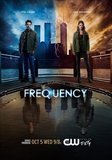 Well, Frequency 1.13 saved the best for last, and I hope that's the last of season 1, with a season 2 to follow, and not the end of the series.
Well, Frequency 1.13 saved the best for last, and I hope that's the last of season 1, with a season 2 to follow, and not the end of the series.The episode opens with as happy an ending as you could hope for in this situation. Raimy's mother Julie is alive and a doctor. Raimy's engaged to be married. Even Gordo's a mentch - actually, a lawyer, in a suit.
The only thing missing is Frank, who was saved at the start of the season, in 1996, but died in a car accident five years ago. In a nice touch, Raimy's fiance wants to know whom she is talking to on the ham radio, and Frank, apprised of this, says maybe it's time to retire their intertemporal chats. But Raimy wants her father at her marriage, and wants to change time at least one more time, and Frank agrees...
This could make a good story in itself, but just in case, the Nightingale killer is still at large, That's because, not only was the son looking like he was going to follow in his father's footsteps (as I thought last week), but it turns out the son actually was the the Nightingale killer all along. He's been controlling himself for 20 years, to take advantage of his father going to prison for him, but he's reached the end of his self-control.
So we've got a really good set-up for a new season. Frank stops the Nightingale - the son - from killing Julie in 1996, but the Nightingale is getting ready to strike again in 2016. And the time-tranversing radio is broken.
But, hey, I just used my own time-leaping cable connection and I think I saw a little bit of the first episode of Season 2, later this year or early next, I'm not sure. If I did, I'll see you then with some more reviews.
See also Frequency 1.1: Closely Spun Gem ... Frequency 1.2: All About the Changes ... Frequency 1.3: Chess Game Across Time ... Frequency 1.4: Glimpsing the Serial Killer ... Frequency 1.5: Two Sets of Memories ... Frequency 1.6: Another Time Traveler? ... Frequency 1.7: Snags ... Frequency 1.8: Interferences ... Frequency 1.9: The Wife and the Fiancee ... Frequency 1.10: The Clarinet of Time ... Frequency 1.11: The Unkilling ... Frequency 1.12: Good Inter-temporal Police Work, But...
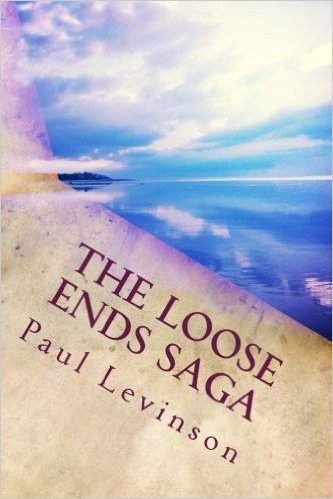
more time travel
Paul Levinson's books ... Paul Levinson's music
Published on January 25, 2017 21:25
January 24, 2017
Doctor Foster: The Affair, On the Other Side of the Pond
 I just watched Doctor Foster, the five-part British 2015 series, recently brought over here by Netflix, after a showing earlier last year on Lifetime. Excellent on all accounts.
I just watched Doctor Foster, the five-part British 2015 series, recently brought over here by Netflix, after a showing earlier last year on Lifetime. Excellent on all accounts.The story starts off as many extra-marital affairs that shake-up families do: Gemma finds a blonde hair on her husband's scarf. She's a brunette, and off we go.
But Doctor Foster has unusual depth and attention to character detail, and this puts the series in league with the other fine account of an affair - The Affair - and in some ways Doctor Foster is better. Gemma is a doctor - Doctor Foster - and has a practice that is in itself the stuff of good narrative. Her husband is on the surface a genial real estate developer, but there's much more beneath the surface. And their son Tom, who looks to be about 11-to-12-years old, has just the right amount of savvy for someone that age.
The series is lifted by Suranne Jones's portrayal of Gemma. Jones has a very expressive face, and conveys Gemma's quick changes of mood, as she struggles with what to believe and what to do about it, what to show to the public and what not, very effectively. The story is well parked in our digital age, as when Gemma is called in by her superior after negative comments are posted about her on a web site that rates and gives feedback about doctors.
Unlike The Affair, in which crime and police investigation are an essential part of the narrative, Doctor Foster sticks almost completely with the affair at hand, and its ramifications. Packed with twists, and highly recommended.
Paul Levinson's books ... Paul Levinson's music
Published on January 24, 2017 11:01
January 23, 2017
Timeless 1.12: Incandescent West
 Timeless keeps getting better every time, and as I've been saying with almost every review of the past few episodes of this series, episode 1.12 was the best episode so far.
Timeless keeps getting better every time, and as I've been saying with almost every review of the past few episodes of this series, episode 1.12 was the best episode so far.Here's why -
1. An excellent Flynn episode, in which he not only interacts with Jesse James - whose life he saves - but with Emma. Who's Emma? Well, she's not only played by 24's Annie Wersching - always up for a gritty, attractive performance on screen - but she's the very first time traveler, who has been hiding out in the past for a decade. This alliance promises some good times ahead.
2. Not only does Jesse James play a big role in this episode, but so does the Lone Ranger and Tonto - and the Lone Ranger is African-American, much to Rufus's delight, and played by Colman Domingo of Fear The Walking Dead. For that matter, Tonto is played by Zahn McClarnon of Longmire (and I just saw him on Frontier). Timeless has had some strong guest starring power all along, but episode 1.12 was a special event.
3. Lucy puts in one of her best roles - actually, it all happens in one scene, but this was something new and important for the show. She shoots Jesse James in the back, for the sake of saving history. Of course, Flynn's actions already changed our history - the Ford Bros no longer did the cowardly deed - but at least Lucy kills Jesse, and in much the same way as in our original history.
4. Wyatt's philosophy is it's right to kill bad people who kill good people. That has never been Lucy's philosophy, but tonight her values and Wyatt's coincide. Clearly they won't in the coming attractions for next week's episode, when Wyatt will try to save his wife which in some big way may change history as Lucy and we know it.
And I'll be back here with a review to tell you how all that went down ...
See also Timeless 1.1: Threading the Needle ... Timeless 1.2: Small Change, Big Payoffs ... Timeless 1.3: Judith Campbell ... Timeless 1.4: Skyfall and Weapon of Choice ... Timeless 1.5: and Quantum Leap ... Timeless 1.6: Watergate and Rittenhouse ... Timeless 1.7: Stranded! ... Timeless 1.8: Time and Space ... Timeless 1.9: The Kiss and The Key ... Timeless 1.10: The End in the Middle ... Timeless 1.11: Edison, Ford, Morgan, Houdini, and Holmes (No, Not Sherlock)!


 Paul Levinson's books ... Paul Levinson's music
Paul Levinson's books ... Paul Levinson's music
Published on January 23, 2017 22:21
January 22, 2017
Homeland 6.2: Parallel Program
 Homeland 6.2 picked up some steam tonight, at least insofar as what Carrie really is doing with her life in New York City.
Homeland 6.2 picked up some steam tonight, at least insofar as what Carrie really is doing with her life in New York City.We already knew she was an attorney, but now we learn she's also been closely advising the President-elect on foreign policy. Saul suspects and Carrie denies it to his face. It's not clear whether he believes her or not. I certainly would never. Dar has photographs which prove it, but he doesn't show them to Saul. Homeland has always been about holding your cards close to your chest.
But Saul going to check out the Mossad story about Iran secretly building nuclear weapons in a "parallel program" - that is, a program running parallel and secret to the inspected facilities - is a nice touch. (My wife aptly commented that she hoped Trump wasn't watching - he'd likely believe the parallel Iranian program was really happening.) The President-elect in Homeland is sending Saul to the Middle East on Carrie's strong suggestion. This means that Carrie is bound to follow - sooner or later - good news for this season.
Also good news is Quinn beginning to get back at least some of his mind. The scene at the end of episode, between Carrie and Quinn, was strong and very much needed. It's unclear whether Quinn can completely recover. But I don't recall anyone saying that he couldn't, so I'm hoping for the best.
Given Trump's problems with the CIA, and his speech there on Saturday, in which he lashed out at the media, this season of Homeland takes on a new significance - enhanced by the President-elect on the show being a woman. I'm looking forward to more of this season and its parallel presidency.
See also Homeland 6.1: Madam President-Elect
And see also Homeland 5.1: Moving into the Age of Snowden ... Homeland 5.2: Who Wants to Kill Carrie ... Homeland 5.3: Carrie and Kerry ... Homeland 5.5: All Quinn ... Homeland 5.6: Saul Wises Up ... Homeland 5.7: Tough to Watch ... Homeland 5.9: Finally! ... Homeland 5.10: Homeland and Homeland ... Homeland 5.11: Allison as Primo Villain ... Homeland Season 5 Finale: RIPs
And see also Homeland 4.1-2: Carrie's State of Mind ... Homeland 4.3: Quinn and Carrie ... Homeland 4.4: Carrie's Counterpart ... Homeland 4.5: Righteous Seduction ... Homeland 4.6: The Biggest Reveal ... Homeland 4.7: The Manifestation ... Homeland 4.8: Saving Someone's Life ... Homeland 4.9: Hitchcock Would've Loved It ... Homeland 4.10: The List ... Homeland 4.12: Out of this Together
And see also Homeland 3.1: Sneak Preview Review ... Homeland 3.2: Sneak Preview Review ... Homeland 3.3: Two Prisons ... Homeland 3.4: Twist! ...Homeland 3.6: Further Down the Rabbit Hole ... Homeland 3.7: Revealing What We Already Knew ... Homeland 3.8: Signs of Life ...Homeland 3.9: Perfect Timing ... Homeland 3.10: Someone Has to Die ... Homeland 3.11: The Loyalist ... Homeland Season 3 Finale: Redemption and Betrayal
And see Homeland 2.1-2: Sneak Preview Review ... Homeland 2.3-5: Sneak Preview Review ... Homeland 2.6: What Brody Knows ... Homeland 2.7: Love Me Tinder ... Homeland 2.8: The Personal and the Professional ...Homeland Season 2 Finale: The Shocker and the Reality
And see also Homeland on Showtime ... Homeland 1.8: Surprises ... Homeland Concludes First Season: Exceptional
#SFWApro
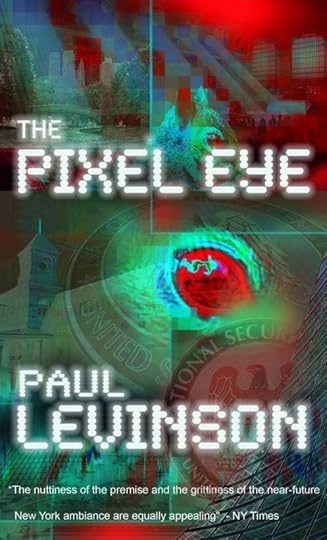
more espionage in New York City
Paul Levinson's books ... Paul Levinson's music
Published on January 22, 2017 23:46
The Affair 3.9: A Sliver of Clarity
[image error]
A strange, provocative episode 3.9 of The Affair tonight, which provided a little clarity into what has been happening to Noah - a very little clarity, actually, but a lot better than almost nothing.
What becomes more clear is why Noah went to prison for what happened to Scott. It was not only to protect Helen and Alison, but to expiate Noah's guilt for mercy-killing his mother. Ok.
Also clear is that Gunther is not at all a bad guy. He's a prison guard, yes, but I'd say that scene with him in the present, back in Noah's hometown, was real. And, if so, then all the scenes we've been seeing this season of Gunther abusing Noah in prison were in Noah's head ... more expiation of his guilt about his mother. This also explains why Noah didn't want Helen to let the prison officials know that Noah had been beaten - because some part of Noah knew he had done that to himself, smashing his face against the wall, or whatever.
Now we get to the part that's less clear - the most important part. Noah stabbed himself in his apartment in New Jersey - I was thinking that was one of the likely explanations since the beginning (see my reviews, listed below). But where did Noah get the knife? Not the knife we saw tonight, which Noah bought in the country store, after he had been stabbed in the neck. We saw Noah holding that knife in his New Jersey apartment, and using it to stab himself, a little ... but that was a reenactment in the present of what happened earlier, a few weeks ago, right?
So what happened to the original knife that Noah used to seriously cut himself? Why didn't the police find it? And, for that matter, can't doctors tell the difference between a self-inflicted wound, and one inflicted by an assailant? Wouldn't the thrust patterns be different?
We did get some real clarity in Helen's story, though. Her conversation with Alison was great, and satisfying to see. And Helen finally unburdening herself was right, too.
Next week, in the season finale, I hope we get a few more questions answered about Noah.
See also The Affair 3.1: Sneak Preview Review ... The Affair 3.2: Sneak Preview Review: Right Minds ... The Affair 3.3: Who Attached Noah? ... The Affair 3.4: The Same Endings in Montauk ... The Affair 3.5: Blocked Love ... The Affair 3.6: The Wound ... The Affair 3.7: The White Shirt ... The Affair 3.8: The "Miserable Hero"
And see also The Affair 2.1: Advances ... The Affair 2.2: Loving a Writer ... The Affair 2.3: The Half-Wolf ... The Affair 2.4: Helen at Distraction ... The Affair 2.5: Golden Cole ... The Affair 2.6: The End (of Noah's Novel) ... The Affair 2.7: Stunner ... The Affair 2.8: The Reading, the Review, the Prize ...And see also The Affair Premiere: Sneak Preview Review ... The Affair 1.2: Time Travel! ... The Affair 1.3: The Agent and the Sleepers ... The Affair 1.4: Come Together ... The Affair 1.5: Alison's Episode ... The Affair 1.6: Drugs and Vision ... The Affair 1.7: True Confessions ... The Affair 1.8: "I Love You / I Love You, Too" ... The Affair 1.9: Who Else on the Train? ... The Affair Season 1 Finale: The Arrest and the Rest
podcast review of every 2nd season episode
podcast review of every 1st season episode



the Sierra Waters time-travel trilogy
Paul Levinson's books ... Paul Levinson's music
A strange, provocative episode 3.9 of The Affair tonight, which provided a little clarity into what has been happening to Noah - a very little clarity, actually, but a lot better than almost nothing.
What becomes more clear is why Noah went to prison for what happened to Scott. It was not only to protect Helen and Alison, but to expiate Noah's guilt for mercy-killing his mother. Ok.
Also clear is that Gunther is not at all a bad guy. He's a prison guard, yes, but I'd say that scene with him in the present, back in Noah's hometown, was real. And, if so, then all the scenes we've been seeing this season of Gunther abusing Noah in prison were in Noah's head ... more expiation of his guilt about his mother. This also explains why Noah didn't want Helen to let the prison officials know that Noah had been beaten - because some part of Noah knew he had done that to himself, smashing his face against the wall, or whatever.
Now we get to the part that's less clear - the most important part. Noah stabbed himself in his apartment in New Jersey - I was thinking that was one of the likely explanations since the beginning (see my reviews, listed below). But where did Noah get the knife? Not the knife we saw tonight, which Noah bought in the country store, after he had been stabbed in the neck. We saw Noah holding that knife in his New Jersey apartment, and using it to stab himself, a little ... but that was a reenactment in the present of what happened earlier, a few weeks ago, right?
So what happened to the original knife that Noah used to seriously cut himself? Why didn't the police find it? And, for that matter, can't doctors tell the difference between a self-inflicted wound, and one inflicted by an assailant? Wouldn't the thrust patterns be different?
We did get some real clarity in Helen's story, though. Her conversation with Alison was great, and satisfying to see. And Helen finally unburdening herself was right, too.
Next week, in the season finale, I hope we get a few more questions answered about Noah.
See also The Affair 3.1: Sneak Preview Review ... The Affair 3.2: Sneak Preview Review: Right Minds ... The Affair 3.3: Who Attached Noah? ... The Affair 3.4: The Same Endings in Montauk ... The Affair 3.5: Blocked Love ... The Affair 3.6: The Wound ... The Affair 3.7: The White Shirt ... The Affair 3.8: The "Miserable Hero"
And see also The Affair 2.1: Advances ... The Affair 2.2: Loving a Writer ... The Affair 2.3: The Half-Wolf ... The Affair 2.4: Helen at Distraction ... The Affair 2.5: Golden Cole ... The Affair 2.6: The End (of Noah's Novel) ... The Affair 2.7: Stunner ... The Affair 2.8: The Reading, the Review, the Prize ...And see also The Affair Premiere: Sneak Preview Review ... The Affair 1.2: Time Travel! ... The Affair 1.3: The Agent and the Sleepers ... The Affair 1.4: Come Together ... The Affair 1.5: Alison's Episode ... The Affair 1.6: Drugs and Vision ... The Affair 1.7: True Confessions ... The Affair 1.8: "I Love You / I Love You, Too" ... The Affair 1.9: Who Else on the Train? ... The Affair Season 1 Finale: The Arrest and the Rest
podcast review of every 2nd season episode
podcast review of every 1st season episode



the Sierra Waters time-travel trilogy
Paul Levinson's books ... Paul Levinson's music
Published on January 22, 2017 22:17
The Perversity of Things: review #8 of X: Definitions and Fake News
Continuing with my reviews (#8 of X) of The Perversity of Things: Hugo Gernsback on Media, Tinkering, and Scientifiction, edited by Grant Wythoff (University of Minnesota Press, 2016) - at a more leisurely place now, reporting here on two gems in pages 52-55 of Wythoff's 59-page Introduction to the 359-page volume.
Wythoff describes Gernsback's keen concern with the definition of science fiction - or scientifiction, as Gernsback usually had it - which in turn led to a thoughtful, even profound, analysis of how much science and truth needs to be in the science fiction. There are several bells that this discussion rung for me.
First, I'm reminded about both Karl Popper's and Marshall McLuhan's dislike for definitions. Popper held that they were a distraction, and McLuhan was fond of quoting French poet Stéphane Mallarmé that “To define is to kill. To suggest is to create.” I generally agree with that, but Gernsback's quest to define science fiction was valuable.
As Wythoff points out, it led Gernsback to probe the evolution of technology, with the realization that the science in science fiction was a progressing target. A century later, anyone familiar with science fiction knows that it predicted and even provided a template for everything from space travel to gene-splicing (H. G. Wells' The Island of Dr. Moreau). In Gernsback's day, this was not as obvious, and he deserves credit for holding science fiction to the test of not only plausibility but physical possibility - which remains an important point of demarcation between science fiction and fantasy.(See this for my very brief definition of the two.)
Gernsback's focus on scientific possibility and truth led to what today is an astonishing example. Wythoff, writing before our current crisis regarding fake news, tells us about Gernsback's 1926 "The Moon Hoax," in an early issue of his Amazing Stories, which reprinted a series of articles in The New York Sun from 1835 which reported an intelligent civilization of the Moon. Gernsback was confident, in 1926, that such a "hoax" would quickly be exposed by radio. He of course missed not only Orson Welles "War of the Worlds" (thanks to my wife Tina for this example), but the way that our social media today not only unmask fake news but disseminate it.
I thought this example was so telling, that I just added it to my Fake News in Real Context. That's what I mean about The Perversity of Things being a treasure trove to anyone who's interested in the evolution and impact of media. And I'll be back here, sooner or later, with more.
See also: The Perversity of Things: review #1 of X: Gernsback as Philosopher of Technology ... #2 of X: Learning by Doing ... #3 of X: The Evolution of Media ... #4 of X: Gernsback and the The First Amendment ... #5 of X: Amateurs vs. Corporations ... #6 of X: Thought Experiments and Toys ... #7 of X: The Invention of Invention and the Advent of Science Fiction
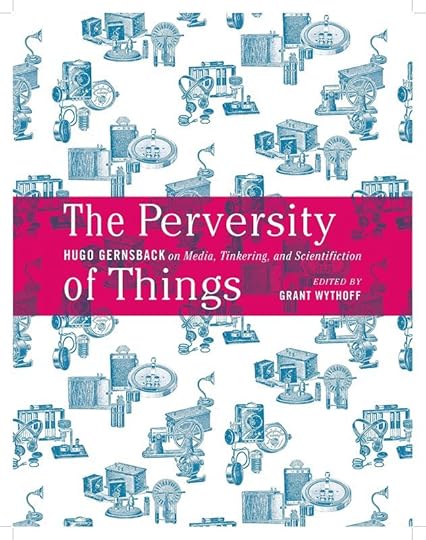
Paul Levinson's books ... Paul Levinson's music
Wythoff describes Gernsback's keen concern with the definition of science fiction - or scientifiction, as Gernsback usually had it - which in turn led to a thoughtful, even profound, analysis of how much science and truth needs to be in the science fiction. There are several bells that this discussion rung for me.
First, I'm reminded about both Karl Popper's and Marshall McLuhan's dislike for definitions. Popper held that they were a distraction, and McLuhan was fond of quoting French poet Stéphane Mallarmé that “To define is to kill. To suggest is to create.” I generally agree with that, but Gernsback's quest to define science fiction was valuable.
As Wythoff points out, it led Gernsback to probe the evolution of technology, with the realization that the science in science fiction was a progressing target. A century later, anyone familiar with science fiction knows that it predicted and even provided a template for everything from space travel to gene-splicing (H. G. Wells' The Island of Dr. Moreau). In Gernsback's day, this was not as obvious, and he deserves credit for holding science fiction to the test of not only plausibility but physical possibility - which remains an important point of demarcation between science fiction and fantasy.(See this for my very brief definition of the two.)
Gernsback's focus on scientific possibility and truth led to what today is an astonishing example. Wythoff, writing before our current crisis regarding fake news, tells us about Gernsback's 1926 "The Moon Hoax," in an early issue of his Amazing Stories, which reprinted a series of articles in The New York Sun from 1835 which reported an intelligent civilization of the Moon. Gernsback was confident, in 1926, that such a "hoax" would quickly be exposed by radio. He of course missed not only Orson Welles "War of the Worlds" (thanks to my wife Tina for this example), but the way that our social media today not only unmask fake news but disseminate it.
I thought this example was so telling, that I just added it to my Fake News in Real Context. That's what I mean about The Perversity of Things being a treasure trove to anyone who's interested in the evolution and impact of media. And I'll be back here, sooner or later, with more.
See also: The Perversity of Things: review #1 of X: Gernsback as Philosopher of Technology ... #2 of X: Learning by Doing ... #3 of X: The Evolution of Media ... #4 of X: Gernsback and the The First Amendment ... #5 of X: Amateurs vs. Corporations ... #6 of X: Thought Experiments and Toys ... #7 of X: The Invention of Invention and the Advent of Science Fiction

Paul Levinson's books ... Paul Levinson's music
Published on January 22, 2017 14:10
Ending the Electoral College
Yesterday as an extraordinary day, the likes I which I haven't seen since I rallied against the Vietnam War at the Pentagon in 1969, and my wife (then girlfriend) and I marched against that same immoral, unconstitutional war that same year in New York City. Yesterday, my son and daughter and nephew marched in New York City against Trump and everything he espouses. My daughter-in-law and mother-in-law marched against the new President and his polices in Washington, DC. Another nephew was at a similar rally for decency in Barcelona. My wife was taking care of our grandson, and I helped out a little with that, too.
The marches against Trump were also rallies against immorality. But not against a violation of the Constitution. Because, unlike the Vietnam War, which occurred without the Declaration of War mandated by our Constitution, Donald Trump was elected President in accordance with our Constitution. He received more than the required majority of votes in the Electoral College.
We'll never be able to precisely identify all the factors that led to this miscarriage of democracy - miscarriage not only figuratively, but literally, since Trump lost the popular vote. If I had to identify the single most important factor, I would certainly put James Comey's public statements about possible Hillary Clinton email on her assistant's computer, so close to the election, in stark violation of FBI precedent and policy, right up there as a grievously significant factor. But it's obviously not the single most important factor. Because that would have to be the Electoral College.
Because, look, even with Comey's statements, Hillary Clinton won the popular vote by nearly three million. Which means that the only absolutely knowable reason Trump not Hillary is now President is Electoral College.
Yeah, I know that Trump's campaign would have been deployed differently if winning depended on the popular vote. But Trump only won because he won very narrowly in a lot of states. How could those narrow margins possibly have added up to a victory for Trump in popular vote, however differently he might have campaigned?
And, this is not the first time in recent history the Electoral College has defeated democracy. The Supreme Court wouldn't have been called on to make a decision in Bush v. Gore over the Florida vote in 2000 - and awarded the election to Bush - if there had been no Electoral College - because in that year, Gore won the national vote, and no one objected to the national vote count.
The rallies yesterday are aptly focused on winning elections in two years, and after. That's the only way to stop Trump and Republicans who support him. But that impressive power - correctly identified in the media as the most powerful demonstrations since the Vietnam War - needs to go further. We need to once and for all retire the Electoral College. We need to insist that a vote in California or New York counts exactly the same as a vote cast in Michigan or Wisconsin.
This doesn't guarantee that someone like Trump would not be elected again. But it will mean that an occupant of the White House will never again be a product of an antiquated system designed to protect the nation from democracy, rather than directly express the will of the people, which is democracy itself.
Paul Levinson's books ... Paul Levinson's music
The marches against Trump were also rallies against immorality. But not against a violation of the Constitution. Because, unlike the Vietnam War, which occurred without the Declaration of War mandated by our Constitution, Donald Trump was elected President in accordance with our Constitution. He received more than the required majority of votes in the Electoral College.
We'll never be able to precisely identify all the factors that led to this miscarriage of democracy - miscarriage not only figuratively, but literally, since Trump lost the popular vote. If I had to identify the single most important factor, I would certainly put James Comey's public statements about possible Hillary Clinton email on her assistant's computer, so close to the election, in stark violation of FBI precedent and policy, right up there as a grievously significant factor. But it's obviously not the single most important factor. Because that would have to be the Electoral College.
Because, look, even with Comey's statements, Hillary Clinton won the popular vote by nearly three million. Which means that the only absolutely knowable reason Trump not Hillary is now President is Electoral College.
Yeah, I know that Trump's campaign would have been deployed differently if winning depended on the popular vote. But Trump only won because he won very narrowly in a lot of states. How could those narrow margins possibly have added up to a victory for Trump in popular vote, however differently he might have campaigned?
And, this is not the first time in recent history the Electoral College has defeated democracy. The Supreme Court wouldn't have been called on to make a decision in Bush v. Gore over the Florida vote in 2000 - and awarded the election to Bush - if there had been no Electoral College - because in that year, Gore won the national vote, and no one objected to the national vote count.
The rallies yesterday are aptly focused on winning elections in two years, and after. That's the only way to stop Trump and Republicans who support him. But that impressive power - correctly identified in the media as the most powerful demonstrations since the Vietnam War - needs to go further. We need to once and for all retire the Electoral College. We need to insist that a vote in California or New York counts exactly the same as a vote cast in Michigan or Wisconsin.
This doesn't guarantee that someone like Trump would not be elected again. But it will mean that an occupant of the White House will never again be a product of an antiquated system designed to protect the nation from democracy, rather than directly express the will of the people, which is democracy itself.
Paul Levinson's books ... Paul Levinson's music
Published on January 22, 2017 01:02
January 20, 2017
Colony 2.2: 1969
 A suitably chilling Colony 2.2 last night, with an especially good intro, which tells us the aliens have had us on their radar since 1969.
A suitably chilling Colony 2.2 last night, with an especially good intro, which tells us the aliens have had us on their radar since 1969.Though, who knows, maybe the aliens in this 1969 clip are good, and will save us from the Hosts who are colonizing the Earth. Not likely, though - and impossible to say at this point, since we still know so little of the attack aka The Arrival or the attackers. We did see a bristling alien vehicle in the air, breaking the sound barrier and potentially ear drums as it lifted, but that's still about it, and still not enough.
Meanwhile, some interesting developments on the ground. Will and his former FBI partner make a good reunited team. Katie's tempted to turn against the resistance because she's desperate to get back Bram, who has in effect been traded for Charlie as being sought by his parents. And it will be fun to see Snyder in charge of the work facility, with his poster being torn down as Proxy.
On the other hand, it's beginning to look as if the hosts are practicing some kind of Invasion of the Body Snatchers, or Puppet Masters, mental takeover of human minds, and that's been done so many times it will need to be wrapped in something really unexpected to make it work in Colony. Come to think of it, it was even done in Falling Skies, to be the point of being worn to shreds.
So Colony remains, as its second season gets underway, full of promise, but still in need of some delivery of crucial plot pieces that go beyond the all-too familiar neo-fascist America.
See also Colony 2.1: Prelude
And see also Colony 1.1: Aliens with Potential ... 1.2: Compelling ... 1.5: Questions ... 1.6: The Provost ... Colony 1.7: Broussard ... Colony 1.8: Moon Base and Transit Zones ... Colony 1.9: Robot Arm ... Colony Season 1 Finale: Not Quite Enough
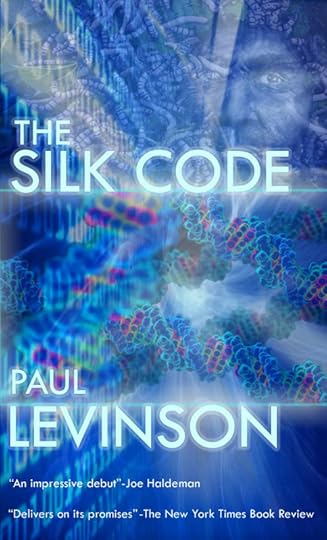
not exactly aliens, but strange enough ... The Silk Code Paul Levinson's books ... Paul Levinson's music
Published on January 20, 2017 16:06
Levinson at Large
At present, I'll be automatically porting over blog posts from my main blog, Paul Levinson's Infinite Regress. These consist of literate (I hope) reviews of mostly television, with some reviews of mov
At present, I'll be automatically porting over blog posts from my main blog, Paul Levinson's Infinite Regress. These consist of literate (I hope) reviews of mostly television, with some reviews of movies, books, music, and discussions of politics and world events mixed in. You'll also find links to my Light On Light Through podcast.
...more
- Paul Levinson's profile
- 342 followers



